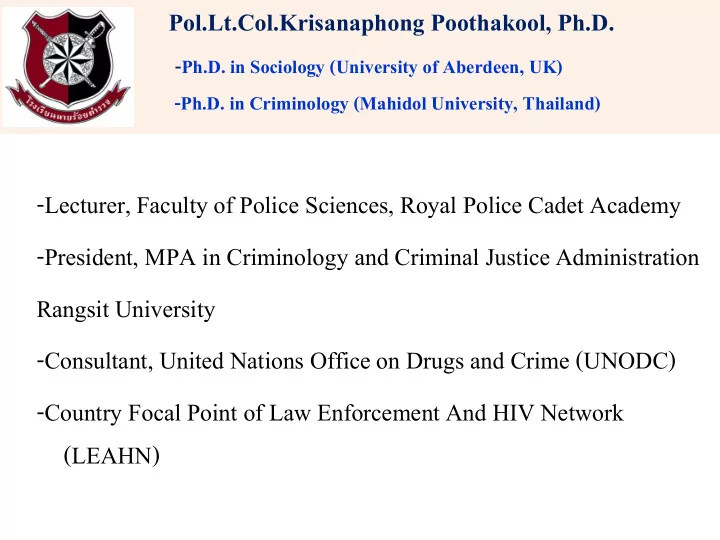

Pol.Lt.Col.Krisanaphong Poothakool, Ph.D. -Ph.D. in Sociology (University of Aberdeen, UK) -Ph.D. in Criminology (Mahidol University, Thailand) -Lecturer, Faculty of Police Sciences, Royal Police Cadet Academy - President, MPA in Criminology and Criminal Justice Administration Rangsit University -Consultant, United Nations Office on Drugs and Crime (UNODC) - Country Focal Point of Law Enforcement And HIV Network (LEAHN )
HIV Situation in Thailand • Thailand successfully tackled HIV/AIDS in the 1990s. • In the early 1990s, when many countries were still in denial, Thailand made HIV prevention a priority. • A large-scale HIV information campaign popularised the use of condoms. • New HIV infections have fallen dramatically, from more than 140,000 in 1990 to 8,200 in 2013 (Bangkok Post, Oct 14).
HIV prevalence among key populations, 2012 Thailand ***While the national HIV prevalence among PWID is three times higher than the national prevalence for MSM, prevalence in Bangkok rapidly increased between 2005- Source: Prepared by www.aidsdatahub.org based on 1. UNAIDS. (2013). Global Report: UNAIDS Report on the Global AIDS Epidemic ; and 2. www.aidsinfoonline.org 2010, and has leveled off at 30% since 2011.
HIV Situation in Thailand (Continued) • Thailand was identified as one of the 24 high Priority Countries for UNODC’s HIV/AIDS program • IDUs, MSM and TG are at high risk of HIV infection. • Government policy • Contradiction between public health and law enforcement approaches toward key populations: Patients vs. criminals
MSM and TG in Thailand • In recent years, Thai authorities have started to focus on HIV prevention in Thailand's gay community. • Thailand's large gay community, which officially numbers about 560,000, or 3 percent of men aged 15 to 49. (Reuters, 5 Oct 14) • In 2013, gays, transgender people and male sex workers accounted for 41 percent of all new HIV infections in Thailand. (Reuters, 5 Oct 14)
World AIDS Day Campaign Former PM Apisit, 25 Nov 2010
Policy in Thailand • Policy in Thailand has an impact on the HIV response (operation crackdown and arrest quota, especially in PWID) • An appointment of National Police Chief • Need for amendment and reform of law
Harm reduction in Thailand Effective Approaches • Workshops in Bangkok, the North and the South on working with key populations • Police-public and NGOs relations • UNODC modules • Royal Police Cadet Academy and Training Centers throughout the country • Training of the trainers
Training of the trainers in Bangkok
Workshops Chiang Rai Bangkok Hat Yai
Key issues Police Roles and Public Health Sectors • Police perceptions towards PWID, MSM and TG • Implementation of long-term strategies to support government policies and public health approaches • Country reform 2014 under military junta
Thai Police cadets and NGOs • Thai Police cadets spread safe sex and human rights-based messages in line with a public health approach • ‘ One Thai Non-Government Organization working with the gay sex worker community has been training Thai police cadets to boost Thai law enforcement support in efforts to promote safe sex in the country's entertainment industry.
UNODC Training Modules • The role of police in public health and the importance of working with vulnerable communities. • The Law, HIV and Knowledge, Attitude and Practices (KAPs): Relevant international and national legislation • Stigma and Discrimination, Human Rights, and HIV • Role of Police Services in Prevention, Care and Treatment of HIV and Hepatitis: Policies and practices • Relationship between law enforcement agencies (LEAs), civil society and NGOs
Future engagement International best practices • Lessons learned from the success and failure of law enforcement approach with key populations has informed approaches in different countries • This has influenced the local context of policy, police and law enforcement culture as well as a range of agencies in other sectors • The LEAHN Network • Country Focal Points (CFP)
Amsterdam, Netherlands
Amsterdam conference
Melbourne
Vienna
Vienna
Promotion of HIV programming in country • HIV prevention program and practices • Head of local communities • Local authorities (An administrative unit of local government) • Public involvement • Media
Meeting with the Head of District Office
The Office of Narcotics Control Region 5
Local Community and KAPs HIV prevention at community level
HIV prevention at community level
Importance of the Media Government Channel (NBT) Channel 5 Channel TPBS Newspaper
Thank you for your attention • Contacts • Mobile: +6682 2902425 • E-mail: k.poothakool@rsu.ac.th thongcop@yahoo.co.uk
Recommend
More recommend